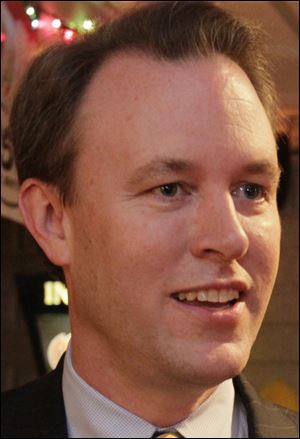
Official makes progress on no-poaching initiative
Communities pledge not to lure neighbors' firms
5/6/2012
Ed FitzGerald.
CLEVELAND — Cuyahoga County Executive Ed FitzGerald is more than half way toward a goal of getting all 57 communities in the county to pledge not to lure businesses from neighbors under an anti-poaching protocol — something he said would be more difficult under the three-commissioner form of government.
"There has been a lot of talk about communities not wanting to steal from each other, but nothing was formally put down on paper," Mr. FitzGerald said.
The so-called no-poaching initiative, which was first floated last year and then was presented in September, offers development money as an incentive to sign on, and so far 30 communities have jumped onboard.
Mr. FitzGerald said the process of signing on cities and villages has been "labor-intensive and very painstaking," mostly because it involves convincing the mayor from each suburb and then a majority of each council.
He said the region was not helped when cities stole businesses from neighbors.
WHO'S ON BOARD?
The Cuyahoga County communities signing onto the agreement not to poach businesses from other communities are:
Brecksville, Broadview Heights, Cleveland, Cuyahoga Heights, Independence, Fairview Park, Lyndhurst, Olmsted Falls, Westlake, Woodmere, Bedford, Berea, Brooklyn Heights, Cleveland Heights, East Cleveland, Euclid, Garfield Heights, Lakewood, Linndale, Mayfield, Moreland Hills, North Olmsted, Orange, Parma, Parma Heights, Pepper Pike, Richmond Heights, Shaker Heights, South Euclid, and University Heights.
"We are moving around pieces on a chess board but we are not growing the economy when we do that," Mr. FitzGerald said. "We are about 75 percent of the population that has signed on, and more and more we are going to be starting to be more strategic with each other."
Member communities that sign on have access to a $100 million development fund, which Mr. FitzGerald said is larger than all of the other development funds from the other 87 Ohio counties combined.
"It is up to $100 million that we are authorized," he said. "And if they sign on, they get priority out of that fund." That cash is available to businesses that need financial help moving into the county.
The county's pact calls for communities to discuss tax sharing and requires suburbs to not pursue local businesses that have not indicated a desire to move, identify an economic development point person and submit information to a central database, and notify the home community if contacted by a business considering a relocation as long as confidentiality was not requested.
The city of Cleveland just signed onto the pact within the past week, Mr. FitzGerald said.
Cleveland has a separate deal with its suburbs in which it agrees to maintain suburban waterlines in exchange for not trying to lure businesses.
Bill Cervenik, mayor of suburban Euclid, commended Mr. FitzGerald for leading the protocol.
"I wouldn't have signed it if I didn't think it was a good idea," Mr. Cervenik said. "I think it's counterproductive for a community to cold call or entice a business to leave another community in Cuyahoga County or in the region unless the location the business is in can no longer grow or expand at its present facility."
Euclid also is part of the Cleveland-led agreement on water.
"We signed that five or six years ago," Mr. Cervenik said. "They were responsible for all the repairs [on] waterlines, and the local communities are responsible for the replacement, which is very expensive."
In exchange for signing, Cleveland takes the responsibility to replace waterlines as needed if the community agrees not to poach.
"We don't poach, and if a business does move to Euclid from Cleveland, then we share the tax revenues for up to five years or until another company fills that empty space," Mr. Cervenik said.
Mr. FitzGerald said his anti-poaching protocol would be possible under the county government system with three commissioners.
"It would be harder, but it would have been possible," he said referring to Cuyahoga County before it switched under voter approval to a county executive and county-council form of government in 2009.
"If you had three commissioners who said, ‘We are going to make economic development and collaboration a priority,' then it is easier," Mr. FitzGerald said.
A nearly identical county reform plan is making its way to the Nov. 6 ballot for Lucas County voters. If adopted, it would abolish 10 countywide offices, all of which are now held by Democrats, and replace them with an elected county executive and a nine-person county council.
Earl Leiken, mayor of the Cleveland suburb of Shaker Heights, which is also in the anti-poaching pact, said the plan was too good to turn down.
"The plan does include a multimillion county economic development fund, and qualifying for grants under that fund is based in part on participation with this agreement," Mr. Leiken said. "I think it helps having a county executive provide very strong leadership to get this done and also to find the resources for a multimillion-dollar fund the county."
-- Ignazio Messina